A lovely morning in Philadelphia with composer Andrea Clearfield was wrapping up. She sat there, framed in the sun, eating the last of her bagel. “I would love,” I confided, “to do something to support other composers.”
Andrea smiled, “Let’s talk to Alex.”
A year later, and together with composers Andrea Clearfield, Alex Shapiro, Mara Gibson, Jennifer Higdon, Cynthia Folio and Alexandra Gardner, we created the Composer Posse, a brain trust of composer wisdom of hundreds of years of practice. In meetings, open to all composers, we share our experiences in topics such social media, tech, networking, balancing family and career, to name a few.
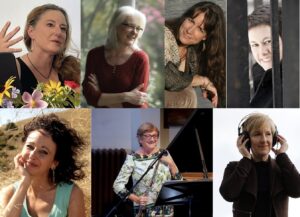
The Composer Posse is about connecting, supporting and acknowledging fellow composers from all genres, career levels and interests.
Life as a composer is always the long game. Surviving the obstacles and setbacks, the highs and lows and just continuing to compose the music is a victory worthy of celebrating. The shared companionship of the Composer Posse makes this easier. Who ever shows up to these meetings is greeted with joyous inclusion, and embraced as one of the tribe, regardless of number of years in this field – a beginner, intermediate, or established composer, even the late comer.
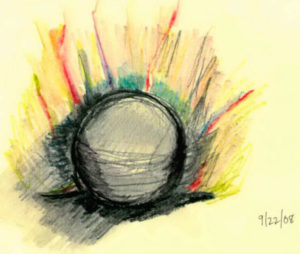 I always wanted to take over the music world. I know it is a silly goal in the face of reality, but I am tired of the competition between composers, not to mention the condescension by classical music to contemporary music, or the lack of opportunities for this generation of music to flourish. So, teaming up with others, I ground my advocacy in radical inclusion. And this has enriched my life beyond measure.
I always wanted to take over the music world. I know it is a silly goal in the face of reality, but I am tired of the competition between composers, not to mention the condescension by classical music to contemporary music, or the lack of opportunities for this generation of music to flourish. So, teaming up with others, I ground my advocacy in radical inclusion. And this has enriched my life beyond measure.
Drawing, colored pencil, © Tina Davidson
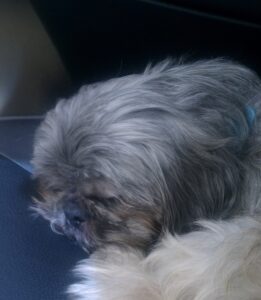 I miss my little dog Max at the oddest times. Not when I look at his collar or his leash laid out next to my bed stand, but in the middle of the night when I absentmindedly reach up to pat the space where he used to sleep. Isabella carefully sleeps down at the bottom of the bed, out of the way of any movement.
I miss my little dog Max at the oddest times. Not when I look at his collar or his leash laid out next to my bed stand, but in the middle of the night when I absentmindedly reach up to pat the space where he used to sleep. Isabella carefully sleeps down at the bottom of the bed, out of the way of any movement.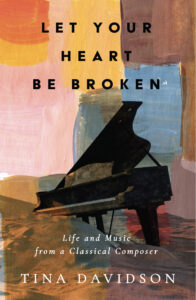 I am reading my memoir, Let Your Heart Be Broken, aloud for the audiobook. This is not an easy thing to do. I have a new respect for the muscles of the lips, mouth and cheek, and where I put my tongue to articulate a word. I am constantly dropping plurals, fumbling over words, or seeing the end of the sentence at the same time I see the beginning, and reordering the words. My engineer often raises his head from my book as he follows along with a look, and even will repeat a fugitive word for me.
I am reading my memoir, Let Your Heart Be Broken, aloud for the audiobook. This is not an easy thing to do. I have a new respect for the muscles of the lips, mouth and cheek, and where I put my tongue to articulate a word. I am constantly dropping plurals, fumbling over words, or seeing the end of the sentence at the same time I see the beginning, and reordering the words. My engineer often raises his head from my book as he follows along with a look, and even will repeat a fugitive word for me. My neighbor, on the other side of the creek, cut down a slender adolescent oak I had been nurturing. In a confusion of where the property line was between our houses, the oak found itself outside of my jurisdiction. So he gleefully chopped it down, and dug up all the roots for good effect.
My neighbor, on the other side of the creek, cut down a slender adolescent oak I had been nurturing. In a confusion of where the property line was between our houses, the oak found itself outside of my jurisdiction. So he gleefully chopped it down, and dug up all the roots for good effect.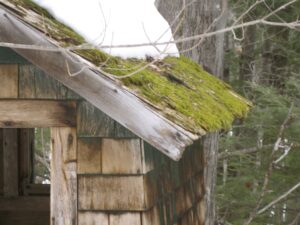 I sigh and drum my pencil on the blank score paper. All morning I have been procrastinating, unable to move forward in composing my next work. I am caught in the bardo of creation – between not knowing and, at the same time, sensing the direction of the piece.
I sigh and drum my pencil on the blank score paper. All morning I have been procrastinating, unable to move forward in composing my next work. I am caught in the bardo of creation – between not knowing and, at the same time, sensing the direction of the piece.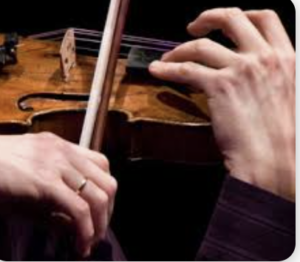 My ear is always bending towards the sound strings produce when I compose. The instrument itself is an ingenuity of construction – as one plays, the open strings resound, building up a deepening of sound – like a piano’s sustaining pedal, but discrete and selective. The resonating strings respond like ghosts to a call, building up overtones and harmonics, even different tones.
My ear is always bending towards the sound strings produce when I compose. The instrument itself is an ingenuity of construction – as one plays, the open strings resound, building up a deepening of sound – like a piano’s sustaining pedal, but discrete and selective. The resonating strings respond like ghosts to a call, building up overtones and harmonics, even different tones.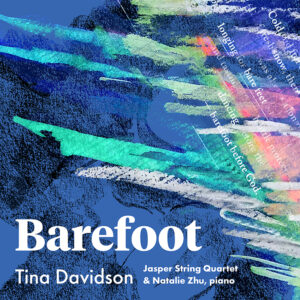 sound to a bare shadow of itself by playing with the wood of the bow) gets closer to what I experience in a single note or tone – an outer shell-like-flesh with a soft inner core.
sound to a bare shadow of itself by playing with the wood of the bow) gets closer to what I experience in a single note or tone – an outer shell-like-flesh with a soft inner core. , religion, education, or just being at the wrong place at the wrong time), break in through the back door or window. No matter how you get in, you are in.
, religion, education, or just being at the wrong place at the wrong time), break in through the back door or window. No matter how you get in, you are in. ars. When I got a commission from the Kronos Quartet, that and my savings allowed me to launch into being able to compose full time.
ars. When I got a commission from the Kronos Quartet, that and my savings allowed me to launch into being able to compose full time. Share your joy.
Share your joy.
 Heave your heart into your mouth – often.
Heave your heart into your mouth – often.